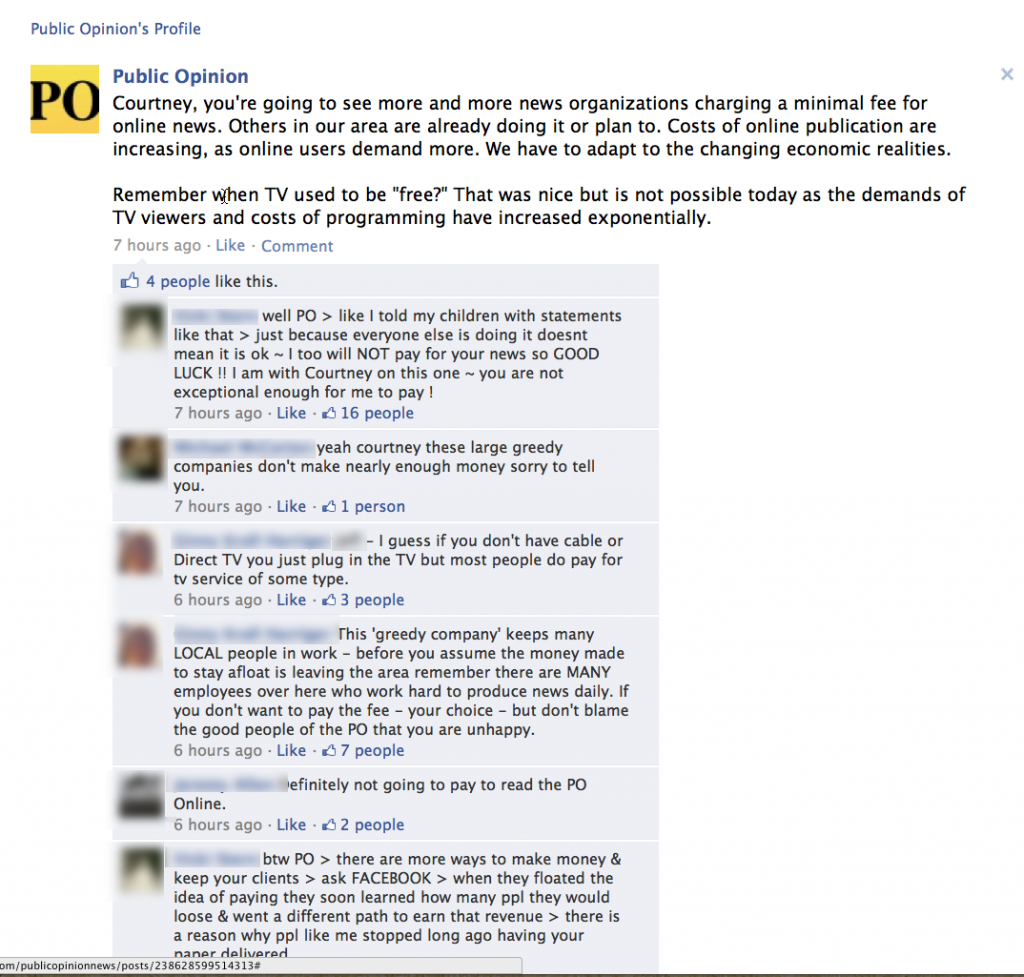Just a day after the east coast earthquake and a few days before Hurricane Irene lands, I was highly interested today in reading local news coverage. I turned to my go-to local news service, the Public Opinion of Chambersburg. I was shocked to find they had switched to a paywall approach, as no notice was given. When the New York Times made the switch, a letter from the editor was posted explaining the changes. http://www.nytimes.com/2011/03/28/opinion/l28times.html. In this instance, the Public Opinion has not communicated with their readers about the upcoming changes. The change took effect in the surge of interest about the earthquake and hurricane. I can’t help but wonder if they took advantage of natural disasters to gain the momentum for this unannounced change.
I don’t believe this funding method has been tested long enough to decide if it’s a beneficial strategy. Just a month after the NY Times change, the verdict on it’s effectiveness was still unclear. I haven’t found any more current information on the matter than this: http://mashable.com/2011/04/11/new-york-times-paywall-stats/. So – is this method of funding the local news going to pay for the expense? I’m not sure that it will.
Rather than a paywall approach, I’d prefer they improve their other means of revenue. Television and radio have existed for free for the public. Even with the cable, satellite, or internet based stations, there is still an interest in the public access media that cover the costs without charging consumers. The reporters and administrative staff do need to be compensated well for their work. I just don’t think the paywall model will save the revenue.
Customer Service – What Not To Do:
The Public Opinion has a rather active fan page. I’ve watched the community interaction increase considerably on the page as they’ve made all comments on their site Facebook comments.
To express my displeasure of the unannounced changes, I took to my own fan page. I did this as any connections made I prefer go through my business brand, not to my personal account. Rather than reaching out to me or posting any announcement changes on their site and fan page, they directly targeted me in their reply.
“Courtney, you’re going to see more and more news organizations charging a minimal fee for online news. Others in our area are already doing it or plan to. Costs of online publication are increasing, as online users demand more. We have to adapt to the changing economic realities.
Remember when TV used to be “free?” That was nice but is not possible today as the demands of TV viewers and costs of programming have increased exponentially.”
While I can understand the need for alternate funding beyond the subscription service, I’m happy to report that I do not subscribe for tv or radio. I watch television via Hulu for free. I only pay a subscription to Comcast for cable internet and Netflix for movies. I also purchase the Sunday papers for coupons, but know that I can print those from the companies supplying the circulars.
What become more snarky and unprofessional though followed the replies of several others.
Coffee should be free. Dang that greedy Starbucks for charging just because McDonalds is charging…trying to follow the logic here.
The logic to this is baffling. It seems fueled as a reply to the commenters, but this is still a representative of the news agency. While Facebook may be informal, the public relations representatives still have basic goals to build community engagement and foster customer relations. What implications does the Public Opinion’s snarky reply have on their relation to the local Starbucks? Is the joke understood?
A better option:
From the start, the Public Opinion should have announced to their online community in particular that changes were coming. Additionally, creating membership could work. Offer readers something to entice them to buy. Give them access to exclusive content – audio or video coverage or special interviews, access to archived content, or even access to breaking news and push the rest of the readers to only view day old content. Create more in value than you get in payment.
- Communicate with the community.
- Gain support for the changes
- Interact with respect for the current and potential customers
A few thoughts on customer service from the book – The Go-Giver by Bob Burg:
Related articles
- Paywall Free-for-All (newspaperdeathwatch.com)
- On Porous Paywalls (businessinsider.com)
- U.K. Times Web Site Paywall Kills Two Thirds of Visitor Traffic (fastcompany.com)


